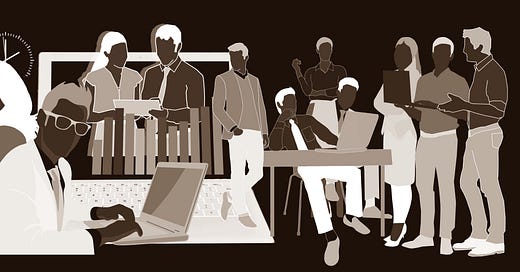The Importance of Trust: When Company Culture Clashes with Employee Wellbeing
After my last role concluded, I have been going for several interviews (mostly unsuccessful) with companies and industries I hadn’t come across previously during my work history.
One such industry which was completely new was EAPS.
Employee Assistance Programs (EAPs) for those who don’t know offer a valuable service for employees facing personal challenges. They provide a safe space for confidential discussions about anything from work-related stress to mental health concerns. EAPs can offer short-term counselling, legal advice, and financial guidance, all designed to help employees navigate difficult situations and improve their overall well-being.
In theory, a strong EAP program can contribute to a healthier and more productive work environment. EAPs provide a free and confidential service for employees and their immediate families that includes, short-term counselling, legal advice, and financial guidance- wherever and whenever.
Probably because most of the last 16 years or so of my career has been working for the back office of the Courts or the Co-Operative, it simply wasn’t something I had come across as interesting as it sounded as it appeared to be aimed at companies not as big as the Courts or the Co-Operative.
I won’t name the company in question I am going to talk about in this short article, when I went for the interview, while I found it an interesting experience, it was not a role I liked the look of if I am honest as the agency in question mis-sold it somewhat and it became apparent that it would be a contact centre role which I had done before and hated massively.
While researching the company, I did come across a worrying article back from March 2024 which worried me when the company received harsh criticism in a File on 4 investigations on Radio 4 about some of their practices.
Whenever I am going to go for an interview, for a role, I regard it as a major must to research the company. If I come across say an article within the past month or so that I didn’t like which would show a side to the company I didn't like, I would cancel the interview with no reason given.
About the company in question, an update on the original BBC hit the news on 14 July 2024. This followed the article in March 2024 stating that the said company were letting corporate clients listen in to confidential helpline calls without the knowledge or permission of callers, the BBC article called. (Source the BBC).
The BBC article then carried on saying that also “The BBC was contacted by scores of people - including 30 current and former employees of Health Assured and its parent company - after we reported claims in March that helpline calls from vulnerable callers were not always handled properly.”
Reading this article helped me reflect on the interview itself when I arrived for it only a few weeks ago, and I was met by one of the team managers for the interview at the reception who I then found out during the interview had been at the company for six weeks. Yes, six weeks and she was expected to then sit on interviews with the section head.
She seemed nice enough, as did the Section Head (although it had to be said I could see myself clashing with her potentially) but the article by the BBC after it contained quotes like “The BBC was contacted by scores of people - including 30 current and former employees of Health Assured and its parent company - after we reported claims in March that helpline calls from vulnerable callers were not always handled properly.”
The question that had me thinking looking back at the interview was the disorganisation of the team I was with, which was the team the article referred to, and if I had been a manager, would I have agreed to go on interviews after six weeks?
This complete lack of respect for confidentiality mirrored the concerns I had about the misrepresentation of the role during the interview process. As I was leaving, I got a glimpse of the office I could have been working in, and it worried me as I saw fear and unhappiness in the people’s faces that worked there.
I’ve worked in teams before now which were badly managed, and you could see it often as soon as you walked into the office.
This did not look like a happy workplace by any stretch of thought.
Not a good sign.
This new article left me looking at the interview afterwards if I had got the job in the sense would I have quit before I even started the job if I had been offered it?
When I worked at the Co-Operative from 2006 to 2011, the first six months or so I was there I worked in their Home Insurance Call Centre and we used to frequently get managers to listen to calls remotely from their agents to make sure they were doing their jobs, never let other companies listen to them.
In an atmosphere where sensitivity is vital to the protection of both the staff members and the clients that they are helping/protecting, a practice like this can cause damage all around to a company’s reputation but more importantly leave all parties embarrassed and for anybody listening who wasn’t trained potentially with mental health issues themselves.
I’m glad they never did this to me at the Co-Operative, I suspect I wouldn't have lasted as long at the Co-operative if they had done that.




